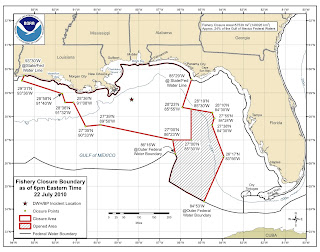
State officials on Thursday trumpeted the reopening of federal waters far off the southwest Florida coast that had been closed to fishing because of the BP oil spill.
Florida officials had pressed the National Oceanic and Atmospheric Administration to reopen waters where they said oil no longer was found. NOAA on Thursday reopened 26,388 square miles, an area almost the size of West Virginia, or about one-third of the area that had been closed to fishing.
The closed area is about 100 miles off the Florida Panhandle, southwest Florida and the Dry Tortugas in the Florida Keys. Federal waters up to 10.3 miles from shore remain closed off the Florida Panhandle between the Alabama state line and Cape San Blas. The harvest of saltwater fish, shrimp and crabs is prohibited only off a portion of Escambia County though the area remains open to catch-and-release fishing.
NOAA Administrator Jane Lubchencho said the reopened federal waters had been closed because of a light oil sheen that officials feared would get in the loop current, taking it to south Florida. She said the area was reopened after fish were tested and showed no detectable oil or chemical dispersants.
“I would feel completely comfortable eating any seafood from this area we are reopening today,” Lubchencho told reporters.
“For nearly 100 days, Floridians have suffered from this tragic event that has injured our environment, economy and quality of life,” Gov. Charlie Crist said in a statement. “The reopening of these waters is an important step in Florida’s recovery, and I encourage visitors from around the country and the world to visit our great state to enjoy our renowned fishing grounds.”
Florida Fish and Wildlife Conservation Commission Chairman Rodney Barreto said the state is working to reopen state waters off the coast of Escambia County and will do so as soon as the threat of oil is gone and laboratory results are clear.
View maps of the reopened areas at NOAA.gov or download by clicking here.
Learn more about the state waters closed to fish harvesting by clicking here.
(Story courtesy of the Florida Tribune. Story copyrighted by Bruce Ritchie and FloridaEnvironments.com. Do not copy or redistribute without permission, which can be obtained by contacting brucebritchie@gmail.com.)
